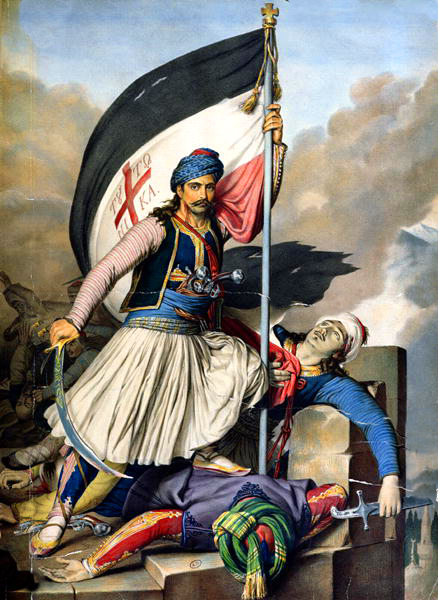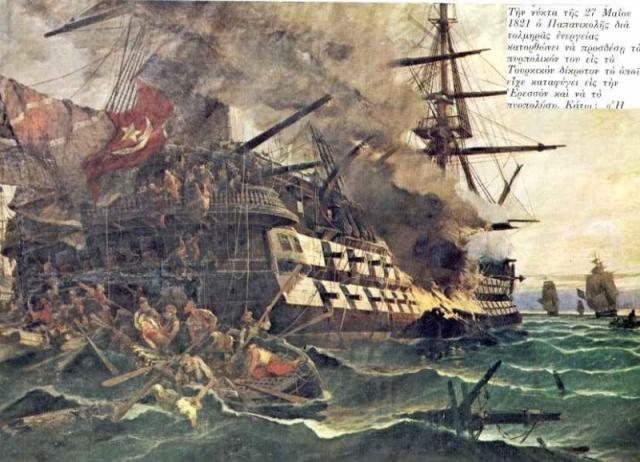Illustrations - Internet
Polina Spartyanova
The strong flame of the April Uprising and its brutal suppression by the Ottomans marked the apex of the Bulgarian national liberation movement. Heroes like apostle Georgi Benkovski and Rayna Knyaginya who sacrificed themselves for the sake of the liberation of their country and compatriots from Ottoman rule are respected along with all the other fighters for the freedom of Bulgaria. However, at times like these, we must remember those heroes who, even before the prominent Bulgarian apostles were born, were able to light the fire of the Bulgarian liberation struggle by taking part in almost all Greek battles for independence, thus contributing towards the liberation of Greece from Ottoman rule.
"Bulgarian generals leading Bulgarian volunteers fought along with Theodoros Kolokotronis, Markos Botsaris, George Karaisakis and other Greek heroes in the sacred struggle for the motherland and freedom. A lot of Bulgarian blood was shed along with the Greek on the battlefields until Turkey that was hitherto considered as an invincible colossus received a death-blow...," Constantine Levidis, the "father of Greek journalism" wrote enthusiastically in 1860 in connection with the self-sacrifice of Bulgarians for the liberation of Greece from Ottoman rule.
 The principles and methods of the revolutionary organization "Filiki Eteria" established in 1814 by the Greeks had consistently influenced the revolutionary efforts of the gradually rising Balkan peoples. Its establishment was followed by the creation of "secret societies" in many Bulgarian towns and villages, which were also involved in the preparation of the uprising, as the greatest researcher of this period of Balkan history, Professor Nikolai Todorov, states in his work "Filiki Eteria and the Bulgarians". According to him, at that time, the Bulgarian population immediately adopted the general liberation sense of the Greek revolutionary action but the differences in the socio-economic, national, and cultural development of the two nations did not allow them to build a pan-Balkan national liberation front. Greek historian Iakovos Michailidis also analyzes the causes for the liberation of Greece nearly 60 years before the liberation of Bulgaria.
The principles and methods of the revolutionary organization "Filiki Eteria" established in 1814 by the Greeks had consistently influenced the revolutionary efforts of the gradually rising Balkan peoples. Its establishment was followed by the creation of "secret societies" in many Bulgarian towns and villages, which were also involved in the preparation of the uprising, as the greatest researcher of this period of Balkan history, Professor Nikolai Todorov, states in his work "Filiki Eteria and the Bulgarians". According to him, at that time, the Bulgarian population immediately adopted the general liberation sense of the Greek revolutionary action but the differences in the socio-economic, national, and cultural development of the two nations did not allow them to build a pan-Balkan national liberation front. Greek historian Iakovos Michailidis also analyzes the causes for the liberation of Greece nearly 60 years before the liberation of Bulgaria.
The revolutionary forces in Wallachia and Moldavia commanded by Alexander Ypsilanti involved 7,000 people, 132 of whom were of Bulgarian nationality. They formed the main contingent of the forces of Eterists in Wallachia and Moldavia, and participated in the movement of Tudor Vladimirescu.
After the complete defeat of the uprising in the Danubian principalities, one of the leaders of "Filiki Eteria", namely Karneadis, sent to Odessa a letter to inform of the failure of Ypsilanti’s uprising, however advising to make the best of this and to undertake a new attempt at rebellion. "Bulgarians, due to their enthusiasm, will welcome the troops with open arms and, fighting together, they will do wonders...," Karneadis persuades in his letter his followers to accept the armed support of the uprising in Greece from the Bulgarian population.

The Greek national liberation uprising brought together the progressive forces in the Balkans, bringing to the fore their common interests, namely to win freedom. Representatives of all Balkan nations fought in the ranks of the freedom fighters from the outset but the number of Bulgarians was the largest. Volunteers from all over Bulgaria set off to the south to take part in the battles against the common enemy, the Ottoman Empire, knowing that, in this way, they would help their own homeland too. The motto of the participants of Bulgarian origin in the Greek uprising was "fight for faith" as they hoped that they would receive the same sympathy and support from their southern neighbour when the Bulgarian population rebelled one day.
The number of Bulgarian participants in the Greek national liberation war exceeded the total number of all other foreign participants put together. A total of 750 people of Bulgarian origin were recorded, not counting the numerous Bulgarian volunteers who remained nameless in the difficult struggle. After September 1821, the ranks of the Greek freedom fighters involved a significant number of Bulgarians who, against their will, had to go to the country together with the Turkish troops, as their assistants, but they sided with the Greeks. Among them, there was a significant number of Pomaks too.